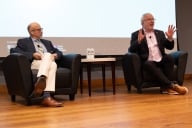You have /5 articles left.
Sign up for a free account or log in.
President Obama’s Council of Advisors on Science and Technology has a message for the federal government and regional accreditors: Go easy on the MOOCs.
In a report released on Wednesday, the council of engineers and scientists recommends the federal government not interfere with vendors and providers experimenting with massive open online courses and other forms of distance education. That message extends further to accreditors, which are encouraged to waive some of the standards required of institutions seeking approval for traditional programs.
“It would also be premature to impose standards and regulations that might impair the power of competitive market forces to motivate innovation,” the report reads. “If the bar for accreditation is set too high, the infant industry developing MOOC and related technology platforms may struggle to realize its full potential.”
As a third recommendation, the council suggests establishing grant programs to spur research into online education and the effectiveness of MOOCs. To support such an initiative, the data could be made available through a "national exchange mechanism" such as a "center for high-scale machine learning."
The accreditation issue is a delicate one, and many faculty critics have questioned why MOOCs are not subject to more oversight. Many of the initial MOOC providers launched with courses that offered no credit, and so said there was no need for accreditation reviews. Recently, however, MOOCs are being used by students to earn credits and certificates -- although the credit often comes from an institution, not a MOOC provider.
In response to the report, regional accreditors pushed back against the idea they are biased against instruction that occurs outside the traditional classroom. Sylvia Manning, president of the Higher Learning Commission of the North Central Association of Colleges and Schools, said the “expectation of basic quality in the means of delivery and in the content” remains constant no matter what type of program is up for accreditation.
“There seems to be a widespread belief that regional accreditation is somehow hampering the development of new technologies and modalities for higher education,” Manning said in a statement. “Ironically, a few short years ago this regional accreditor was severely criticized for allowing such development. I would be grateful for permission to be flexible, let alone encouragement.”
A spokesman for the Council for Higher Education Accreditation pointed to a document published in November 2012, in which president Judith S. Eaton examined whether accreditors should play a role in determining the quality of MOOCs.
“MOOCs offer an unusual direct-to-student opportunity for expansion of learning, apart from the traditional structure of programs and degrees,” Eaton wrote. “Whether ultimately apart from or connected to the environment of currently accepted teaching and learning, judgment about quality will be essential.”
Cathy Sandeen, the American Council on Education’s vice president education attainment and innovation, said she thought accreditors may not object to the contents of the report, but rather how it portrays them.
“I think they have shown a history of adapting to different forms of higher education,” Sandeen said. “Enhancing, adopting innovation that helps students and increases attainment -- this is something everybody is in favor of, but the recommendation doesn’t necessarily acknowledge the complexity of the accreditation process.”
The council has worked on the report for the past year, during which it has sought input from many of the players in higher education who have pushed for the kinds of recommendations the report now contains. Key contributors include, among others, Zvi Galil, dean of the Georgia Institute of Technology College of Computing, which is on the cusp of launching a new online master’s degree program in computer science with MOOC provider Udacity; Robert A. Lue, faculty director of Harvard University’s edX platform, HarvardX; and Candace Thille, assistant professor at Stanford University and director of Carnegie Mellon University’s Open Learning Initiative.
Obama praised Georgia Tech for its work with Udacity this August when he unveiled his plan to hold the world of higher education accountable for student outcomes.
The council bases its recommendations on rising tuition costs and a need to provide more flexible modes of education. MOOCs may play a part in solving those issues, but Wednesday’s MOOC-centric report is only the first in a series on technology in higher education.
“There seems to be some worry about MOOCs, but I have not heard of a single MOOC that has suffered at the hands of accreditation,” Manning wrote. “Nonetheless, it is important to keep in mind that ‘innovative’ and ‘good’ are not necessarily synonyms, and innovation cannot serve as a cloak of immunity to criticism: Accreditors must reserve the right to call out poor quality whether it be innovative or stodgy.”








